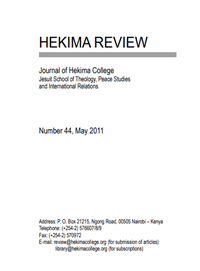The Feminine theory of Peace-building and conflict transformation
Keywords:
FeminismAbstract
Historically, many societies have espoused and limited women to the traditional roles of child care, giving birth, and caring for the young from the cradle to responsible adulthood. Despite this belief, women play the role of educators ensuring that both boys and girls receive responsible upbringing and socialization. In this set-up, practical moral teachings are transmitted and sons and daughters are taught proper behavior and societal ethos. Values such as respect, honesty, uprightness, patience, self-control, and compromise are mostly transmitted through the mother, enabling them to be promoters of harmony in the community and builders of a culture of peace. Apart from providing for their families’ needs, women participate in conflict mediation and conflict resolution within the family, and often times some elderly women participate at the community level. This paper aims to highlight the fundamental importance of the feminine touch in the search for peace and in conflict transformation with more emphasis laid on African realities and cases.
Downloads
Published
Issue
Section
License
Copyright (c) 2024 Hekima Review

This work is licensed under a Creative Commons Attribution-ShareAlike 4.0 International License.


